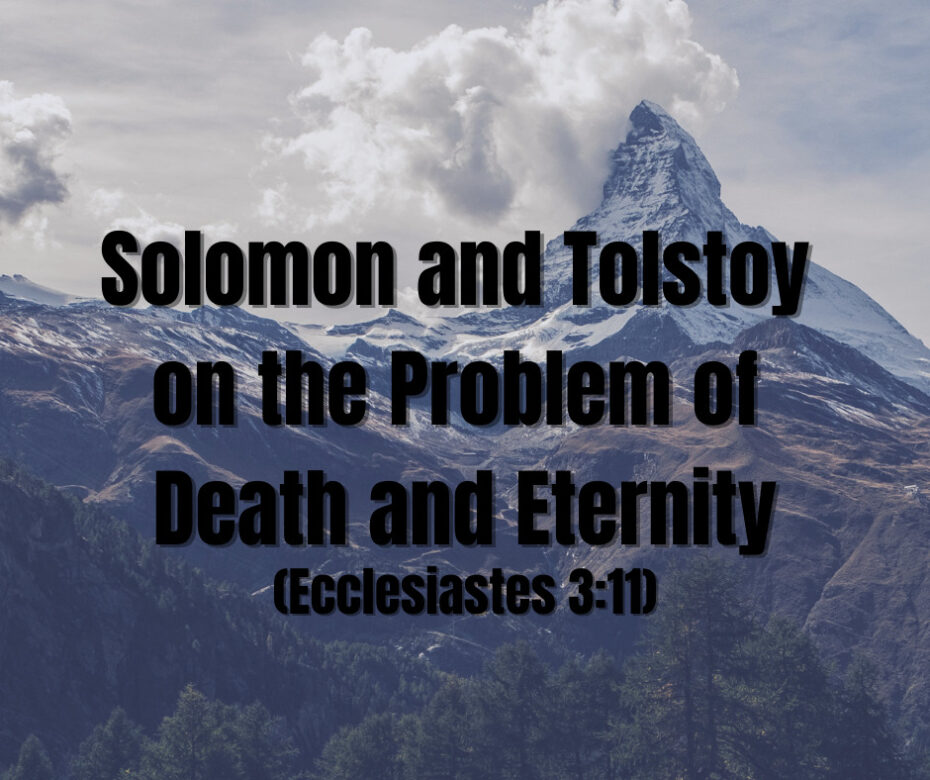King Solomon repeatedly pronounced that everything under the sun was vanity—it was meaningless. In an earlier blog, I said that Solomon’s argument could be put in the form of a syllogism:
Premise 1: All labor is under the sun (Eccl 1:3).
Premise 2: All under the sun is vanity (Eccl 1:14).
Conclusion: Therefore, all labor is vanity.
But why is it all vanity? What arguments or processes of reasoning led Solomon to that drastic conclusion?
I believe it boils down to one problem: death.
There was nothing Solomon could do, build, learn, collect, or enjoy that would not end in death (Eccl 2:14-15; 3:19-21; 12:2-8). So if, in the long run, it did not matter whether he lived as a great king or a nameless loafer, why should Solomon bother trying to do anything at all? Isn’t it all vanity?
Enter Leo Tolstoy.
Significantly, Tolstoy was similar to Solomon in many ways. He was an aristocrat, extremely wealthy, and was already regarded as one of the greatest novelists of all time.
Who could possibly want for more?
However, none of that earthly prestige satisfied him. And eventually, Tolstoy considered suicide. His book, A Confession—very similar to Ecclesiastes and often mentioning Solomon—boiled the problem down to this:
My question, the one that brought me to the point of suicide when I was fifty years old, was a most simple one that lies in the soul of every person, from a silly child to a wise old man. It is the question without which life is impossible, as I had learnt from experience. It is this: what will come of what I do today or tomorrow? What will come of my entire life?
Expressed another way the question can be put like this: why do I live? Why do I wish for anything, or do anything? Or expressed another way: is there any meaning in my life that will not be annihilated by the inevitability of death which awaits me? (A Confession, pp. 34-35, emphasis added).
Tolstoy found that nothing in his life—as materially and culturally rich as it was—could give his life meaning in the face of death.
That was Solomon’s conclusion, too.
So what’s the answer? Why go on living?
The answer begins by recognizing that Solomon and Tolstoy’s conclusion comes from assuming a particular perspective.
Specifically, Solomon wrote Ecclesiastes from below, from a worm’s eye point of view, as if this earthly life is all there is. And his pessimistic conclusions are a reductio ad absurdum for any attempt to find life’s meaning from that perspective.
But that begs the question—is an earthly perspective the only one you can take?
No!
There is another perspective—not under the sun, but beyond it.
If death were the ultimate end, Solomon and Tolstoy would be right, and all our labor would be in vain. But is death the end?
Even in Ecclesiastes, we get hints—but only hints—of a larger possibility:
He has made everything beautiful in its time. Also He has put eternity in their hearts, except that no one can find out the work that God does from beginning to end (Eccl 3:11).
Yes, everything under the sun is vanity, and if you try to find significance there, you’ll fail. But don’t you long for something more, something more enduring, something that says you have eternal importance beyond the sun?
That’s what Ecclesiastes points to—a longing for eternity in your heart.
Suppose for a moment that what you do under the sun has eternal significance beyond the sun; would your life and labor be vain then?
Solomon raises the question but doesn’t answer it. At least, not in Ecclesiastes. And that fits the purpose of the book. Peter Kreeft once said Ecclesiastes asks the big existential questions that the rest of the Bible answers.
So if that question intrigues you, keep reading the Bible (and notice what Biblical book comes next!).
Think of Ecclesiastes as the cliffhanger—not for you to jump off, but for you to keep turning the pages to find the answers to your deepest longing.


